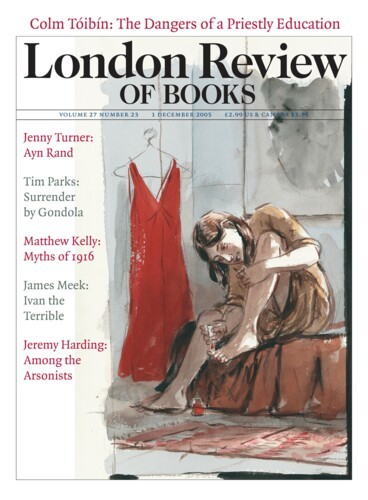One of the better regular sketches on Spoons, the latest moderately funny formulaic comedy show to be broadcast by Channel 4 on Friday nights, involves a man reciting a remarkably long list of all the things that he hopes the people he’s with aren’t going to talk about. I’ve only seen it a couple of times, so I can’t be sure – and it’s possible that the show relies on nobody’s watching it more than a couple of times – but I hope that the list is completely new each week. Which might make you wonder how the writers managed to come up with quite so many tedious subjects. Did they lurk about in pubs and restaurants, taking notes on the dreary conversations going on around them? Or did they simply scour a few days’ worth of the Daily Mail? Then again, perhaps they got hold of a pre-publication copy of Is It Just Me or Is Everything Shit? The Encyclopedia of Modern Life by Steve Lowe and Alan McArthur (Time Warner, £9.99).
Some of the entries in Is It Just Me . . . ? that have also – or at any rate might well have – appeared on Spoons are: Tony Blair, chick-lit, city breaks, Sofia Coppola, Alain de Botton, Eats, Shoots and Leaves, Tracey Emin, exercise videos, foot spas, Ikea, improving the value of your property, Boris Johnson, Kabbalah, lastminute.com, Live8, loft-living, loyalty cards, the Oscars, paninis, Tony Parsons, Harold Pinter’s anti-war poetry, poledancing lessons, the property ladder, Queen musicals, sex tips, The South Bank Show, Tesco, overpriced toast, and washed and ready-to-eat vegetables. Of course, as Lowe and McArthur demonstrate, it’s not what you talk about that matters, but the way that you talk about it.
Here they are on ‘advice slips’, for example: ‘In what meaningful sense does a receipt from a cashpoint constitute advice? All it says is: “You haven’t got any money.” That’s not advice.’ Or on ‘email bragging’: ‘People who “complain” about how many messages they get sent, especially after they get back from holiday – “I’m still ploughing through them!” Yes, well done. You’re really fucking important.’ The things that make Lowe and McArthur most angry are self-important rich people, and not having enough money themselves. Or to put it more generously, what makes them most angry is social inequality. They define ‘the property ladder’ as ‘a marvellous system that separates society into . . . the smug and the damned’. There’s a spirited attack on faith schools, and another on ‘equality of opportunity’: ‘a cunning political phrase beloved of New Labour because it includes the word “equality”. . . while meaning something completely different’. Its latest incarnation is the even emptier promise of ‘aspiration for all’.
Lowe and McArthur are preaching to the converted: they don’t have anything to say that would qualify as argument. The entries, like the book’s title, simply ask to be agreed with. And someone who didn’t agree with them wouldn’t find it difficult to bounce back their remarks on ‘observational comedy’: ‘Standing on a stage. Making trite observations about everyday life. In a futile attempt to be funny. What’s that all about? Have you seen that?’ We’re looking at it right now, think disgruntled fans of Boris Johnson and Alain de Botton. But the key to being a good stand-up is getting the crowd on your side, and Lowe and McArthur for the most part manage that – at least with readers who aren’t taken in by Boris Johnson’s floppy-haired-bumbler-on-a-bike act. One of their winning ways is owning up to their contradictions: the press release describes Is It Just Me . . . ? as ‘an excoriating broadside against consumer capitalism that the authors hope will sell loads of copies’.
But who will buy them? Who are the converted? If it isn’t just Lowe and McArthur (and me) who think everything’s shit, who else does? Lots of different kinds of people think everything’s shit, but they have different ideas about what ‘everything’ is. The latest issue of the Spectator (ed. Boris Johnson), for example, doesn’t like socialism, too many Muslims in Europe, Scottish politics, scientists who don’t believe in God, opponents of Jean-Marie Le Pen, or nurses. It doesn’t say they are ‘shit’, exactly, but that’s mere vocabulary. Dedicated readers of the Spectator no doubt nod sagely or chuckle wheezily along to these opinions – serious agreement with Mark Steyn on the threat of the Muslim hordes; guffawing at Jeremy Clarke on stupid nurses – and would dismiss anyone who disagreed with them as either deluded or a politically correct killjoy.
To their credit, Lowe and McArthur don’t have an entry on ‘political correctness’, though it features in what they have to say about ‘common sense’, where they quote Michael Howard: ‘Whenever there is a conflict between political correctness and common sense, let me tell you where I stand – firmly on the side of common sense!’ ‘Common sense’ here being a Tory euphemism, as Lowe and McArthur point out, for ‘hating gypsies’. ‘Refreshingly un-PC’ and ‘political correctness gone mad’ are popular terms of, respectively, approbation and abuse among reactionaries, and both are used to try to justify otherwise indefensible points of view. Taki’s definition of happiness as ‘to wake up and find Le Pen president of France’, for example, would qualify as refreshingly un-PC. And my taking offence is no doubt a case of political correctness gone mad. But that’s OK, because whenever there’s a conflict between political correctness and ‘common sense’, I know where I stand – firmly not on the same side as Michael Howard.
Send Letters To:
The Editor
London Review of Books,
28 Little Russell Street
London, WC1A 2HN
letters@lrb.co.uk
Please include name, address, and a telephone number.

